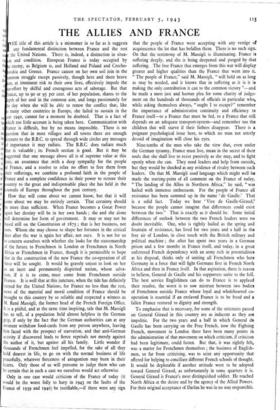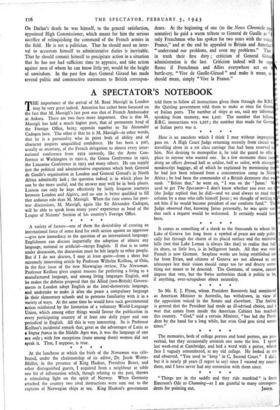THE ALLIES AND FRANCE
HE title of this article is a misnomer in so far as it suggests any fundamental distinction between France and the rest Le the United Nations. There is, indeed, a distinction in situa- on and condition. European France is today occupied by e enemy, as Belgium is, and Holland and Poland and Czecho- ovakia and Greece. France cannot on her own soil join in the mmon struggle except passively, though here and there brave en, at imminent risk to their own lives, effectively impede the ar-effort by skilful and courageous acts of sabotage. But that ranee, up to 90 or 95 per cent. of her population, shares to the epth of her soul in the common aim, and longs passionately for e day when she will be able to renew the conflict that, like many other countries in Europe, she failed to sustain in the o ear 1940, cannot for a moment be doubted. That is a fact of hich too little account is being taken here. Communication with it rance is difficult, but by no means impossible. There is no ne uestion that in most villages and all towns there are enough tenets to the B.B.C. to spread through wide circles any messages f importance it may radiate. The B.B.C. does radiate much at is valuable ; its French section is good. But it tray be uggested that one message above all is of supreme value at this it me, an assurance that with a deep sympathy for the people f France, and a resolve to relax no effort to free them from to eir sufferings, we combine a profound faith in the people of ranee and a complete confidence iu their power to restore their ountry to the' great and indispensable place she has held in the ounsels of Europe throughout the past century.
How that will come about we cannot know, but that it will ome about we may be entirely certain. That certainty should more than sufficient. When France becomes a Great Power again her destiny will be in her own hands ; she and she alone will determine her form of government. It may or may not be based still on the Constitution of 1875 ; that is her business, not ours. Whom she may choose to shape her fortunes in the critical days after the war is again her affair, not ours. It is not for us to concern ourselves with whether she looks for the statesmanship of the future to Frenchmen in London or Frenchmen in North Africa or Frenchmen in France, though it is permissible to hope that in the construction of the new France the co-operation of all three will be sought. It would be gravely unjust to look on her as an inert and permanently dispirited nation, whose salva- tion, if it is to come, must come from Frenchmen outside France. It is well that at this juncture, when the tide has definitely turned for the United Nations, for France no less than the rest, news of the material and moral condition of France should be brought to this country by so reliable and respected a witness as M. Rene Massigli, the former head of the French Foreign Office. It is a pitiful, and at the same time inspiring, tale that M. Massigli has to tell, of a population held almost helpless in the German grip, if only by the fact that the German authorities can at any moment withdraw food-cards from any person anywhere, leaving him faced with the prospect of starvation, and that anti-German activity if discovered leads to fierce reprisals not merely against the author of it, but against all his family. Little wonder if thousands of Frenchmen feel impelled, for the sake of all they hold dearest in life, to go on with the normal business of life peacefully, whatever fierceness of antagonism may burn in their hearts. Only those of us will presume to judge them who can be certain that in such a case we ourselves would as otherwise.
Only in one case would criticism of the France of today (it would be the worst folly to harp in 1943 on the faults of the France of 1939 and 1940) be justifiable,—if there were any sign that the people of France were accepting with any vestige of acquiescence the lot that has befallen them. There is no such sign.
On that the testimony of M. Massigli is illuminating. France is suffering deeply, and she is being deepened and purged by that suffering. The free France that emerges from this war will display greater and higher qualities than the France that went into it.
" The people of France," said M. Massigli, " will hold on as long as may be needed, and it knows that in suffering as it is it is making the only contribution it can to the common victory "—and he made a most just and human plea for some charity of judge- ment on the hundreds of thousands of officials in particular who, while asking themselves always, " ought I to escape?" remember the importance of administrative continuity and efficiency to France itself—to a France that must be fed, to a France that still depends on an adequate transport-system—and remember too the children that will starve if their fathers disappear. There is a poignant psychological issue here, to which no man not utterly devoid of imagination will close his eyes.
Nine-tenths of the men who take the view that, even under the German tyranny, France must live, mean in the secret of their souls that she shall live to resist passively as she may, and to fight openly when she can. They need leaders and help from outside, but they would be shocked at any evidence of rivalry between such leaders. On that M. Massigli used language which might well be made the starting-point of all comment on the France of today. " The landing of the Allies in Northern Africa," he said, " was hailed with immense enthusiasm. For the people of France all resistance has been summed up in the name de Gaulle.' That is a solid fact. Today we hear Wive de Gaulle-Giraud,' because the people cannot imagine that differences could exist between the two." That is exactly as it should be. Some initial differences of outlook between the two French leaders were no doubt inevitable. One, who is rightly hailed as the spring and fountain of resistance, has lived for two years and a half in the free air of London, in close touch with the British military and political machine ; the other has spent two years in a German prison and a few months in France itself, and today, in a great unfettered French dependency with an army rich in potentialities at his disposal, thinks only of uniting all Frenchmen who hate Germany in a force that will fight Germans first in French North Africa and then in France itself. In that aspiration, there is reason to believe, General de Gaulle and his supporters unite to the full. The best service Englishinen can do to France is to applaud their resolve, the worst is to sow mistrust between two bodies of Frenchmen outside France whose loyal and wholehearted co- operation is essential if an enslaved France is to be freed and a fallen France restored to dignity and strength.
To emphasise that is necessary, for some of the strictures passed on General Giraud in this country are as indecent as they are impolitic. For the two years and a half in which General do Gaulle has been carrying on the Free French, now the Fighting French, movement in London there have been many points in the administration of that movement on which criticism, if criticism had been legitimate, could fasten. But that, it was rightly felt, was a matter for Frenchmen themselves ; the business of English- men, so far from criticising, was to seize any opportunity that offered for helping to conciliate different French schools of thought. It would be deplorable if another attitude were to be adopted toward General Giraud, as unfortunately in some quarters it is. General Giraud is France's most distinguished soldier. He reached North Africa at the desire and by the agency of the Allied Powers. For their original acceptance of Darlan he was in no way responsible. On Darlan's death he was himself, to the general satisfaction, appointed High Commissioner, which meant for him the serious sacrifice of relinquishing the command of the French armies in the field. He is not a politician. That he should need an inter- val to accustom himself to administrative duties is inevitable. That he should commit himself to precipitate action in a situation that he has not had sufficient time to appraise, and take action against men of whom he can know little yet, would be the height of unwisdom. In the past few days General Giraud has made several politic and constructive statements to British correspon- dents. At the beginning of one (to the News Chronicle re sentative) he paid a warm tribute to General de Gaulle as " only Frenchman who has spoken for two years with the voice France," and at the end he appealed to Britain and America " understand our problems, and even my problems." That in truth their • first duty ; criticism of General Girau administration is the last. Criticism indeed will be su fluous if Frenchmen and Allies everywhere act on battle-cry, " Vive de Gaulle-Giraud " and make it mean, as should mean, simply " Vive la France."



























 Previous page
Previous page